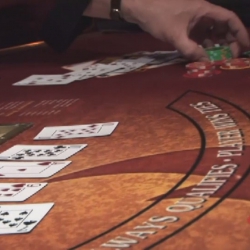
The study found the average caller to the helpline has $38,000 in debts, but did not specify it was all from problem gambling.
The Wisconsin Council on Problem Gambling estimates the average problem gambler has $38,090 in debt. That is what Rose Blozinski of the WCPG told Steves Point Journal recently.
According to the gaming addiction activists, those gamblers have maxed-out credit cards and little money in the bank account. Most of them not only have lied to their family members, but many have stolen from their family to feed the addiction. Rose Blozinski said they often are having problems at work, too.
“Devastating Impact on the Gambler”
The executive director of the Wisconsin Council on Problem Gambling said recently, “A gambling addiction very often has devastating impact on the gambler, as well as his or her family, and even their workplace.”
Blozinski’s said that problem gambling leads to thoughts of suicide or attempted suicide in extreme cases. Bankruptcy or foreclosures often lead to those thoughts.
That is according to the council’s reports to problem gambling hotlines in 2016, Blozinski said. The Wisconsin Council on Problem Gambling took 13,081 calls from gamblers in 2016, but she said the number of calls do not reveal the full story. Many people never make that call.
Gambling Debts Lead to Suicidal Thoughts
Though the report cited over 13 thousand callers, the report focused only on those willing to share information. The must smaller sample revealed that 14 people filed for bankruptcy due to gambling problems, while 15 had “thoughts of suicide or suicide attempts“.
One caller noted his sister tried to commit suicide after maxing out 10 credit cards and falling $100,000 in debt. She had taken out payday loans and had a lien on her car.
Another man noted he had suicidal thoughts after gambling away his rent money. Blozinski said, “One thing we are hearing more about is suicidal thoughts. We don’t know if it’s happening more or if people are talking about it more….They’re not huge numbers, but to us, even one suicide is too many.”
Helpline on Stress and Desperate Situations
The helpline director said, “Many of the callers to the helpline face desperate situations….(Major gambling losses) are really stressful. People don’t understand how desperate it can be. They may have bankrupted the entire family; they may be in trouble legally. Everything just kind of escalates and some think (suicide) is the only way out.”
Many do not see bankruptcy and counseling as a realistic alternative. Facing seven years of bad debt and terrible credit scores makes the future seem bleak and hopeless. Addiction of any kind makes people feel out of control, but an addiction which directly affects the pocketbook often makes that sense worse.
Gambling Addiction Percentages
Proponents of gambling often state that the percentage of gamblers with compulsive behavior is only 1% to 3%. That is likely the case, but it does not make the condition of those with problem gambling any easier.
It should be noted that the Wisconsin Council on Problem Gambling does not go into great detail about other causes of financial issues in the gamblers’ lives. Addictions and disorders often are “co-morbid” — that is, they go hand-in-hand with each other.
Those interested in knowing more about comordibity in psychology can read a 2012 study by Sayyed Salman Alavi called “Behavioral Addiction versus Substance Addiction: Correspondence of Psychiatric and Psychological Views“, which compares and contrasts the different forms of addiction.
Researchers at St. Michael’s Hospital have found similar links, while Narconon backs the hospital’s findings. For instance, several personality disorders state that a sufferer exhibits compulsive behavior in two or more areas: alcohol, drugs, shopping addiction, eating addiction, or sexual relations. Addiction therefore is a manifestation of deeper problems, and gambling addiction might combine with shopping addiction or other compulsive behaviors to lead to a financial crisis.
Yale School of Medicine Research
Yale University’s School of Medicine released a study in 2014 which showed a link between gambling addiction and shopping addiction. People who exhibited one were more prone to manifesting the other behavior.
